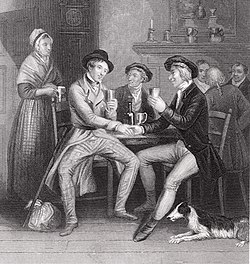Portal:Scotland/Selected articles 2/96

"Auld Lang Syne" (Scots pronunciation: [ˈɔːl(d) lɑŋ ˈsəi̯n]) is a popular Scottish song, particularly in the English-speaking world. Traditionally, it is sung to bid farewell to the old year at the stroke of midnight on New Year's Eve/Hogmanay. By extension, it is also often heard at funerals, graduations, and as a farewell or ending to other occasions; for instance, many branches of the Scouting movement use it to close jamborees and other functions.
The text is a Scots-language poem written by Robert Burns in 1788 but based on an older Scottish folk song. In 1799, it was set to a traditional tune, which has since become standard. "Auld Lang Syne" is listed as numbers 6294 and 13892 in the Roud Folk Song Index.
The poem's Scots title may be translated into standard English as "old long since" or, less literally, "long long ago", "days gone by", "times long past" or "old times". Consequently, "For auld lang syne", as it appears in the first line of the chorus, might be loosely translated as "for the sake of old times".
The phrase "Auld Lang Syne" is also used in similar poems by Robert Ayton (1570–1638), Allan Ramsay (1686–1757), and James Watson (1711), as well as older folk songs predating Burns.
